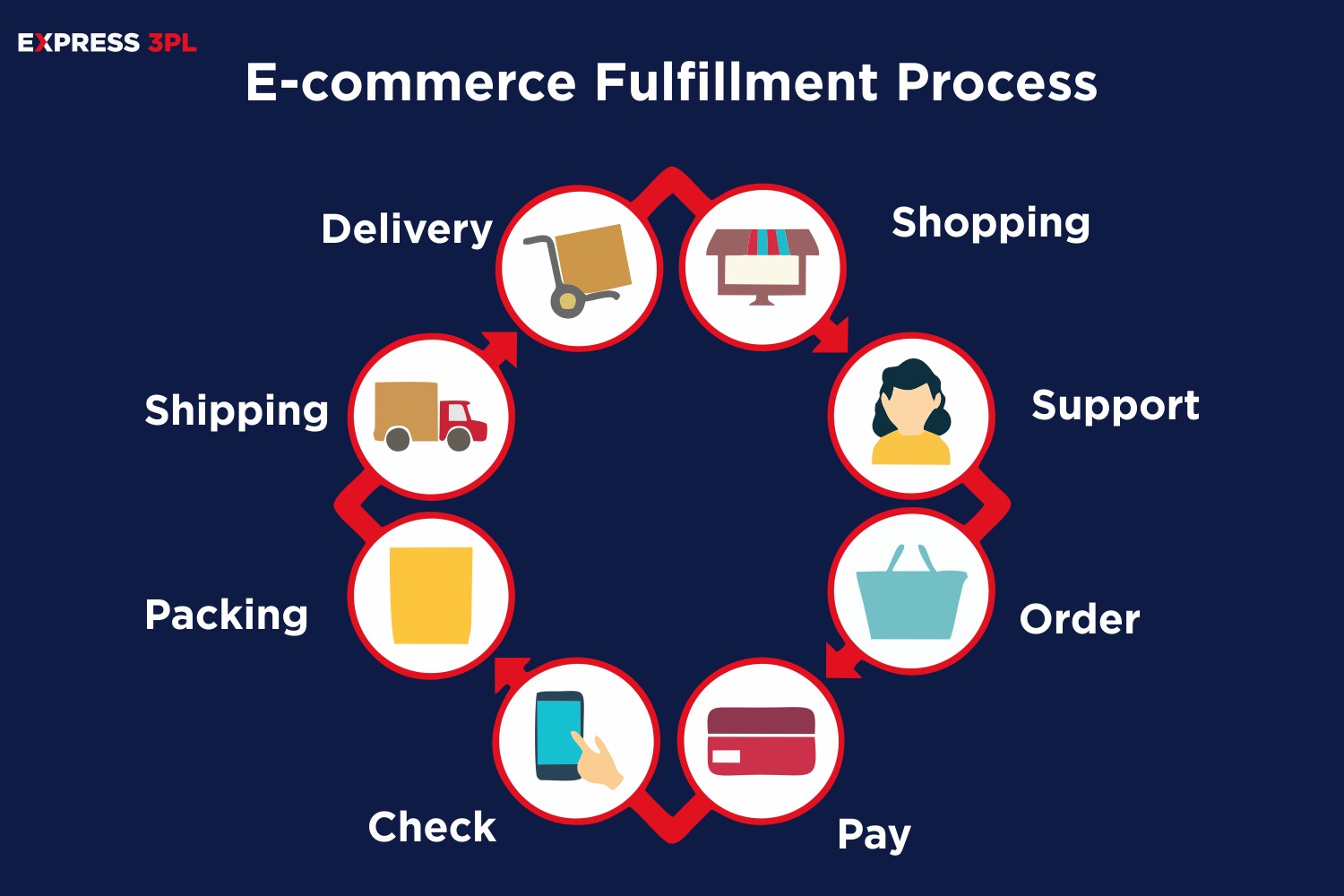Ecommerce Fulfillment

Unlike traditional retail distribution, where a customer goes to a brick-and-mortar store to purchase an item, the goal of ecommerce brand is different. It need to ship orders as efficiently as possible to customer’s doorstep. Fulfillment is the process of getting orders ready and deliver them to customer once purchase is done online. If brands don’t deliver orders on time, it can significantly impact customer satisfaction, brands reputation and profit as a whole.
Key steps in ecommerce fulfillment process
It is important for digital native brands to know pieces involved in successfully delivering goods to its customer. Fulfillment process can be broadly categorized into five components.
1. Receiving
Before sending orders, physical inventory needs to be built-in. A proper system should be in place to efficiently receive products and correctly record inventory count.
This is a significant step as it determines: How much stock is available, when to reorder inventory and avoid stocking-out.
2. Inventory storage
Also known as warehousing is organization and storage of products in secured and safe environment. At initial stage of business, when order volumes are less, brands prefer to keep inventory in-house (operating from home, brick-and-mortar store or rented warehouse). Once business scale, brands may prefer outsourcing to fulfillment experts for efficient inventory handling and storage.
Each SKU must have separate and dedicated storage location for easy retrieval.
3. Order processing
Upon receiving of order in the online store, the order must be processed. The steps include, picking or retrieving right orders, inspection, packing and labeling.
Picklist is often used in large scale operations for efficient retrieval of multiple SKUs from storage locations.
4. Shipping
There are various options available for shipping of merchant. Brands can use courier companies or engage shipping aggregator in selection of courier partner depending upon pin codes: where order is to be delivered.
Shipping items should be weighed beforehand to avoid discrepancy with courier companies.
Few recommended courier partners in India are Bluedart, DHL, Shadowfax, Delhivery. Brands can integrate with aggregators like Shiprocket and Shyplite to find best suited courier partners. Once the order is shipped, it is important to receive tracking number and share the same with customers to keep them up-to-date with delivery status.
5. Return management
Return processing is a critical aspect of fulfillment, ease of it has a significant impact on customer satisfaction. In terms of operations, returns are expensive and time-consuming because of the procedures involved like picking items back from customer, receiving & inspection at fulfillment centre, stock back or discard articles and refunding to customer.
Setting up right return policy in place is crucial and higher return rate can potentially cost bottom-line. Which fulfillment model suits your ecommerce brands Ecommerce brands can adopt fulfillment model based on type of product (size), order volume, scale of business operations and own expertise.
These are common fulfillment method brands can chose from
1. In-house fulfillment or Self-fulfillment
Self-fulfillment is common for brands in early stage of business when the volumes are low. Here 100 % control of operation is with brands i.e. receiving, pick & pack and shipping.
Although a less expensive model which provide better control of inventory, it requires efforts and time to find warehouse space.
There is investment involved in recruitment & staffing, storage racks, material handling equipment’s, inventory and order management software.
Self-fulfillment can be a time-consuming affair which may take up lot of valuable time instead of focusing on customer acquisition, new product developments and marketing strategy for brands. 2. Third Party fulfillment
Often when business expands, managing own distribution network becomes a complex task. Its then brands need to decide outsourcing fulfillment activities to third party fulfillment service provider or 3PL.
3PL handle the entire fulfillment process from receiving inventory, storage, order processing, pick & pack, labelling, shipping and return management.
Typically, 3PL operates from one or more fulfillment location giving advantage of keeping inventory closer to customer, they have logistics expertise and capacities of getting discounted rates from courier partners due to large volume of shipments handled daily.
3PL allow brands to bulk purchase inventories as there is no limitation on storage spaces hence profit margins are improved With 3PL engaged, there is no separate investment on warehouse equipment’s, manpower or order processing software’s.
The only challenge : Brands need to do due diligence on selection of right 3PL so as quality of order fulfillment is not compromised as it can break customer satisfaction level and affect life time value.
3. Dropshipping
Dropshipping is another popular model adopted by modern brands, where the entire responsibility of fulfillment is with manufacturer. It produces, pack and ship the products upon order placement by customer through brands online store. Low overheads make dropshipping a great starting place, multiple products can be integrated easily and offered to customer for faster business growth. Downside: In dropshipping there is no control over inventory management, quality of order fulfillment which means reputation of brands is in hand of other party.
Logistics coordination becomes a challenge when dealing with multiple manufacturers once business scale.
Summary
Based on business growth, brands need to strategize its fulfillment strategy.
If you are just starting off, self-fulfillment or dropshipping is a best fit. However if you are witnessing a robust growth third party fulfillment will allow to focus on core business competency.
The ultimate goal for brands should be, not to compromise customer expectations of faster and affordable shipping.
At Express 3PL, we align ourselves with ever evolving need of ecommerce brands.
We offer self-fulfillment spaces to ecommerce brands at key locations so as they can manage order fulfillment efficiently on its own.
For brands looking to outsource, we provide end-to-end fulfillment solution through as integrated platform.
Get in touch to learn how you can start fulfilling next order with Express 3PL.